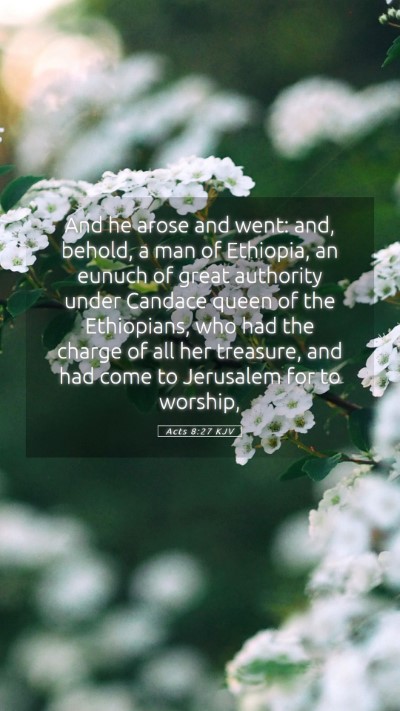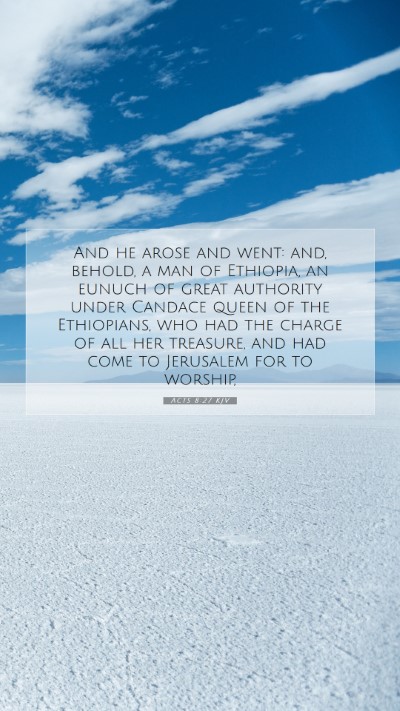Understanding Acts 8:27
In Acts 8:27, we read: "And he arose and went: and, behold, a man of Ethiopia, an eunuch of great authority under Candace, queen of the Ethiopians, who had the charge of all her treasure, and had come to Jerusalem for to worship." This verse introduces us to a pivotal moment in the missionary work of the early church, highlighting several important themes as explained through various public domain commentaries.
Bible Verse Meanings
Acts 8:27 reveals themes of divine guidance and the spreading of the gospel. The journey of the Ethiopian eunuch symbolizes the outreach of the gospel beyond Jewish communities to the Gentiles, demonstrating the universal nature of the message of Christ.
Bible Verse Interpretations
- Divine Direction: Commentators like Matthew Henry suggest that Philip's obedience to the prompting of the Spirit illustrates the importance of being attuned to God’s leading in our lives.
- Symbol of Authority: The mention of the eunuch’s high position indicates that the gospel penetrates all social classes, making it relevant for influential figures as well as common people.
- Seeking Worship: The eunuch’s journey to Jerusalem to worship exemplifies the spiritual thirst that exists in those seeking God, a theme emphasized by Albert Barnes.
Bible Verse Understanding
The eunuch’s character as a dignitary shows that God's call is for all, reinforcing that his path to salvation is highlighted through an ordinary encounter with Philip. This leads to a greater understanding of God’s inclusivity as interpreted by Adam Clarke.
Bible Verse Explanations
Additional insights into Acts 8:27 reflect on the historical context of the Ethiopian's journey. His position under Candace, the queen, speaks to both wealth and the many complexities of ruling during that era. His need to travel to Jerusalem shows the early religion's impact, sought out by those in leadership positions.
Significance of the Eunuch
Acts 8:27 not only highlights the eunuch's importance but also calls attention to the diversity of those who were coming to faith. The eunuch is a significant figure in scripture, showing how the message of the gospel transcends ethnic and social barriers.
Application of the Verse
For modern believers, Acts 8:27 is a powerful reminder of the importance of being sensitive to God's leading and being willing to reach out to others, regardless of their background or status. It encourages active participation in sharing the message of Christ and recognizing the inherent value in every individual.
Related Bible Cross References
- Acts 8:36-39: The continuation of the eunuch's journey and his baptism by Philip signifies acceptance into the faith.
- Isaiah 56:3-5: This passage speaks of the welcome God extends to eunuchs, demonstrating a prophetic fulfillment.
- Galatians 3:28: This verse reinforces the idea of unity and equality among believers, irrespective of social status, gender, or ethnicity.
Bible Study Insights
In the context of Bible study and community discussions, Acts 8:27 serves as an essential topic regarding the mission of the early church and its implications for today's world. Engaging with this verse in a Bible study group can lead to a fruitful exploration of divine guidance, the importance of inclusivity in faith, and how we, too, can respond to God’s calling.
Conclusion
Acts 8:27 beckons readers to reflect on their responsiveness to God's direction and their role in spreading the gospel. The encounter between Philip and the Ethiopian eunuch opens discussions not just about historical contexts but also personal applications for contemporary believers navigating their faith journeys.


